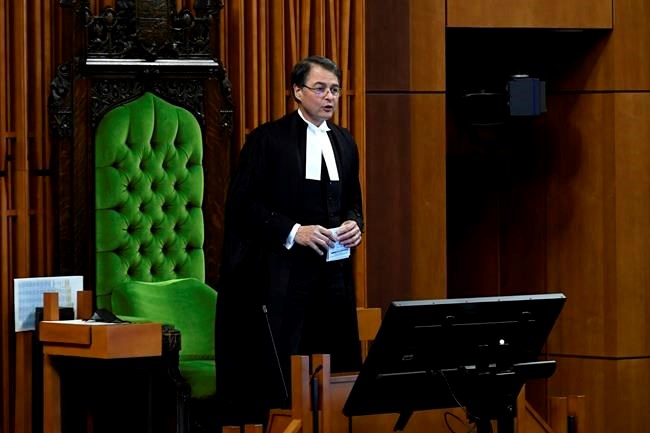OTTAWA — The federal government plans to reintroduce a bill in the House of Commons identical to one already passed unanimously by the Senate to legally recognize the evolution of the upper house into a more independent, non-partisan chamber.
It has given notice of a bill to be introduced as early as Friday after Commons Speaker Anthony Rota expressed qualms about the Senate's authority to initiate the legislation.
On Wednesday, Rota said he was concerned about the Senate initiating a government bill, known as S-2, because it involves allocating funding for the various groups in the upper house.
He noted that the Senate does not have the constitutional power to initiate legislation involving the appropriation of public money.
Rota asked MPs to let him know what they thought before deciding whether to let the bill proceed in the Commons.
Rather than wait for a ruling, the government served notice Thursday that it will not proceed with S-2 and will introduce a new bill in the House to accomplish the same end.
Bill S-2 would have amended the Parliament of Canada Act to formally recognize the transformation that the Senate has undergone since 2015, when Prime Minister Justin Trudeau began appointing only non-partisan senators nominated by an arm's-length advisory body.
The act currently acknowledges the existence of only recognized political parties in the Senate — in practice, just the Liberals and Conservatives, with one or the other designated as the government caucus and the other as the official Opposition caucus.
The bill was intended to reflect the reality that the vast majority of senators now sit in three groups unaffiliated with any party: the Independent Senators Group, the Progressive Senate Group and the Canadian Senators Group.
It would have provided funding for each group and its leadership and conferred some additional powers on them.
The Conservatives, the last remaining partisan group in the Senate with just 18 members, would have remained the official Opposition, with no diminution of their funding or powers.
The bill also would have recognized that the government caucus now consists of just three senators: the government representative in the Senate, his or her legislative deputy and a government liaison.
The Senate unanimously passed a previous version of S-2 in the last Parliament but it died with the call of an election in August, before the Commons could deal with it. Senators swiftly revived it once the new Parliament began sitting last month, expediting the bill's passage through the upper chamber.
Sen. Marc Gold, the government representative in the Senate, expressed disappointment Thursday with Rota's reservations about the bill.
"As someone who enthusiastically supports Bill S-2, I was surprised and frankly very disappointed by the statement by the Speaker in the other place," he told fellow senators.
Gold noted that the bill contained a "non-appropriation clause" — indicating that funding provisions would not go into effect until recommended by the governor general following approval of the bill in the Commons. That's "a common feature" of Senate practice that has allowed multiple bills to be initiated in the upper house in the past, he said.
Gold also noted that Rota raised no objections to the bill passed by the Senate in the previous Parliament, "even though the bill was identical" to S-2.
Gold told the Senate that the government now intends to give "high priority" to introducing and passing in the Commons a new bill to replace S-2.
Rota's reservations about S-2 created an unforeseen obstacle to the government's hopes to quickly amend the Parliament of Canada Act. . However, the amendments were never certain to get a smooth ride through the House in any event.
The NDP and Bloc Québécois, both of which advocate abolition of the Senate, were never likely to support entrenching Trudeau's more independent Senate in legislation.
Conservative Leader Erin O'Toole has promised to encourage provinces to elect senators, whom he would appoint to the Senate should he become prime minister.
Liberals are nevertheless hoping that Conservatives in the House will follow the lead of their compatriots in the Senate in supporting changes to the act to recognize the current reality in the upper house.
They note that nothing in Bill S-2 would prevent a future Conservative government from changing the way senators are appointed or returning the Senate to a strictly partisan chamber.
This report by The Canadian Press was first published Dec. 9, 2021.
Joan Bryden, The Canadian Press


